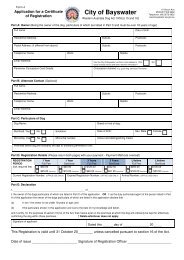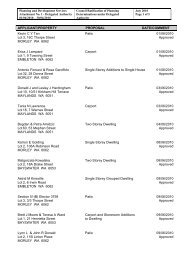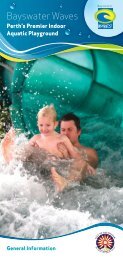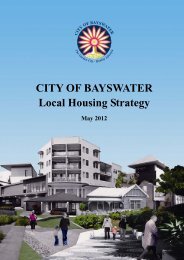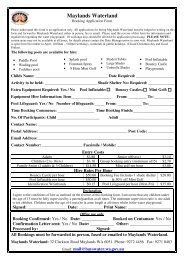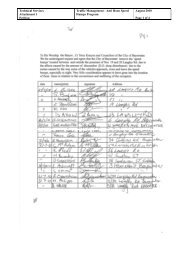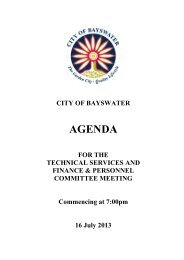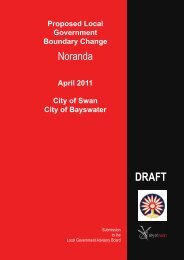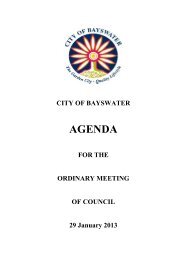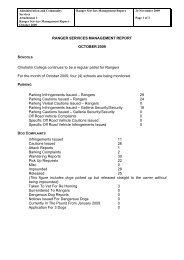Annual Report - City of Bayswater
Annual Report - City of Bayswater
Annual Report - City of Bayswater
- No tags were found...
You also want an ePaper? Increase the reach of your titles
YUMPU automatically turns print PDFs into web optimized ePapers that Google loves.
Waste transfer station, <strong>Bayswater</strong>EnvironmentalHealthWaste managementDuring 2009-10, the <strong>City</strong> <strong>of</strong><strong>Bayswater</strong> was awarded a $50,000grant from the Waste Authority’sStrategic Waste Initiatives Schemeto review green waste recyclingpractices and the barriers thatresidents may have in recyclinggreen waste materials in their browntop bins. Over 4,500 tonnes <strong>of</strong>green waste was recycled throughthe <strong>City</strong>’s green waste system,which was used by the EMRC toproduce high quality soil improverand mulch for the <strong>City</strong>’s parks andgardens and private sale.Emergency managementThe <strong>City</strong> <strong>of</strong> <strong>Bayswater</strong> LocalEmergency ManagementCommittee met every three monthsto consider ways to make thecommunity a safer place in theevent <strong>of</strong> an emergency such as afire, flood, pandemic or major storm.Following the threat <strong>of</strong> the H1N1swine flu pandemic, the <strong>City</strong>developed the first stage <strong>of</strong> aBusiness Continuity Plan andhosted a community informationforum on epidemics in April 2010.The forum covered the threatposed by pandemics, the role <strong>of</strong>the Department <strong>of</strong> Health, the <strong>City</strong>’simmunisation program and what thecommunity can do to protect itself.Immunisation program– 2009-10Approximately 1,130 childrenwere vaccinated in 2009-10, thisrepresents a ten per cent increaseover the previous financial year.The general trend suggested thatthe number <strong>of</strong> parents supportingthe <strong>City</strong>’s immunisation clinicsremained high.The <strong>City</strong> also continued to provideschool vaccinations for thechildren aged 12, (Hepatitis B andDiphtheria, Tetanus and WhoopingCough, Chicken Pox andCervical Cancer).Food legislationIn October 2009, the Food Act 2008was introduced in Western Australia.The Act is now the principal piece<strong>of</strong> legislation regulating the sale andpreparation <strong>of</strong> food in WA. The Actsets out food safety requirementsoutlined in the Australia NewZealand Food Standards Code. Thismeans a food business in the <strong>City</strong><strong>City</strong> <strong>of</strong> <strong>Bayswater</strong> Hostel, kitchen facility<strong>of</strong> <strong>Bayswater</strong> must meet the samerequirements as a food businessoperating anywhere else in Australia.Food surveillanceThe <strong>City</strong> <strong>of</strong> <strong>Bayswater</strong>’sEnvironmental Health Sectionmonitors food business activitieswithin the <strong>City</strong>, to ensure compliancewith the Food Act 2008 andAustralia New Zealand FoodStandards Code.The <strong>City</strong> monitors around 320food premises and undertakes upto four inspections <strong>of</strong> all high riskfood premises each year. During2009-10, with the introduction <strong>of</strong>the Food Act 2008, a new foodsampling scheme was developedrequiring each Local Authority toconduct routine sampling <strong>of</strong> allfood manufacturers within theirown jurisdiction. A total <strong>of</strong> 59food samples were collected andsubmitted for analysis and complaintinvestigation, and five requiredfollow-up action.city <strong>of</strong> bayswater annual report 2009-1019



